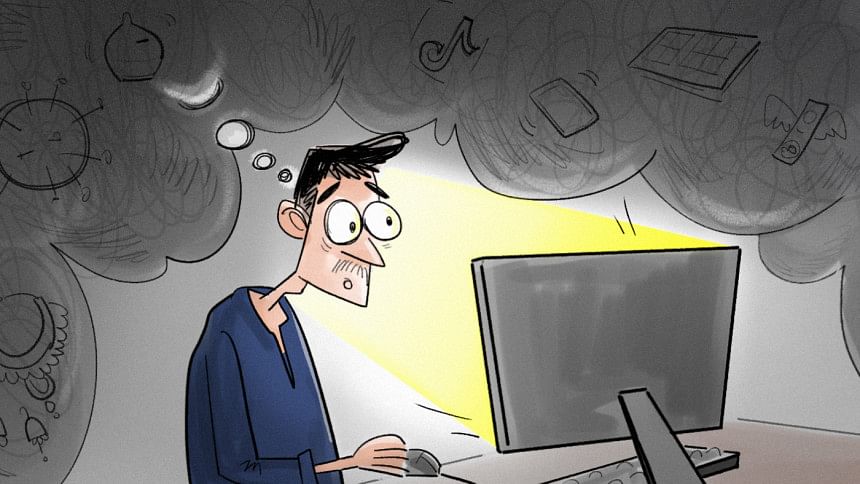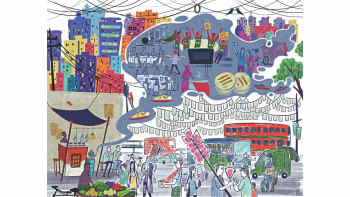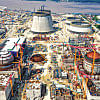The sun also rises

The message is loud and clear: St Martin's Island is not for sale. When was it up for sale anyway? We, the public, scratch our heads. The presumed buyer shies away from shrugging shoulders: hey, don't blame me! Who said I wanted to buy it anyway? I just needed a place to rest and see the sea where nuclear whales of different colours swim. You never know when you might need a friendly referee. Besides, if there is any rerun of the movie Chandni Chowk to China, you might want me on the couch with a bag of popcorn. And don't you forget that rogue neighbour of yours who is good at pushing back humans while supplying radioactive minerals to the wrong hands.
Trouble is brewing in Pakistan, too. The news is fresh, but unclear. The country is reportedly leasing its largest port in Karachi to the UAE to keep things afloat. Sri Lanka did the same with one of its ports, handing it over to China. We have read stories of the travelling usurer kabuliwala even before mobile banking or microfinance was made popular. We have heard about our parents going to pawn shops when recessions hit hard or when depressions hit home following stock shocks, Ponzi schemes or share scams. Now countries are looking for bailouts. If you can't pay, they will take your jewels away. The audit teams of IMF are sure to have their way. No wonder, the jewel hoarders are scared. They are withdrawing their treasures from the Swiss Alps and hiding them away in offshore islands. Guess the state of an individual is no different from the State that gives the aura of being so strong and powerful. The soft underbellies are exposed. The world is in a mess. Inflation. Food shortage. Climate change? Oh, that too!
Those of us who thought the sickness trail of the pandemic was over have a rude awakening. The world is getting sicker by the day. It's sicker than the woke vandals who tarnished museums would like you to believe. Yes, the glacier cap is melting. You need to find alternatives to fossil fuels. What do you do? Harness natural energy. Solar power and battery-driven cars seem to be the answer. You need a lot of lithium and cobalt to make electric vehicles and solar panels. Africa has them in abundance. Who is there first? China. The seven European powers who "Scrambled for Africa" between 1834 and 1914 meekly tried to make their way back into the heart of darkness. The responses of the African leaders are not only nationalistic, but also defiant. Much to the dismay of Western officials, many African leaders and governments have either supported Moscow's invasion of Ukraine or refused to condemn it. They hailed China as their development partner. The West was told that the Rest of the World was tired of being lectured.
The international order is changing what can only be described as what CNN's Fareed Zakaria calls "the rise of the rest." Isn't it the Bible that says, "One generation passeth away, and another generation cometh: but the earth abideth forever. The sun also ariseth, and the sun goeth down, and hasteth to his place where he arose" (Ecclesiastes)? Ernest Hemingway used this idea for the title of his novel, The Sun Also Rises, to respond to his literary colleague of the Parisian circuit Gertrude Stein. It was Hemingway's way of refuting Stein's characterisation of the modernist writers as "the Lost Generation."
Zimbabwean President Emmerson Mnangagwa, for instance, has described both Russia and China as "dependable pillars for many years" which "assisted us in our fight for independence, but equally … to defend our sovereignty against the sustained onslaught by our detractors." By "onslaught of the detractors," Mnangagwa is probably referring to various Western sanctions on his country for human rights abuses.
The internet is rife with terms such as de-dollarisation, BRICS, electoral dictatorship, and liberal world. It is tough for my old brain to navigate through the explainers by media pundits about the changing world order as well as the reels made by the TikTok generations.
The international order is changing what can only be described as what CNN's Fareed Zakaria calls "the rise of the rest." Isn't it the Bible that says, "One generation passeth away, and another generation cometh: but the earth abideth forever. The sun also ariseth, and the sun goeth down, and hasteth to his place where he arose" (Ecclesiastes)? Ernest Hemingway used this idea for the title of his novel, The Sun Also Rises, to respond to his literary colleague of the Parisian circuit Gertrude Stein. It was Hemingway's way of refuting Stein's characterisation of the modernist writers as "the Lost Generation."
On a Saturday, named after Saturn in Latin, I muse over the calamities that we are facing. In Vedic astrology, the placement of celestial objects can impact our lives. An ill placement or retrograde of Saturn is known for causing harm and hindrances. Then again, in Old Norse, Saturday is known as laugardagur – "the day of the hot water" or "bathing dag." It is the day of cleansing. In some parts of Germany, the day is Sunnunótt – the night before Sunday.
Optimistic that I am, I would like to believe that this, too, shall pass, and the sun also shall rise.
Dr Shamsad Mortuza is a professor of English at Dhaka University.


 For all latest news, follow The Daily Star's Google News channel.
For all latest news, follow The Daily Star's Google News channel. 









Comments